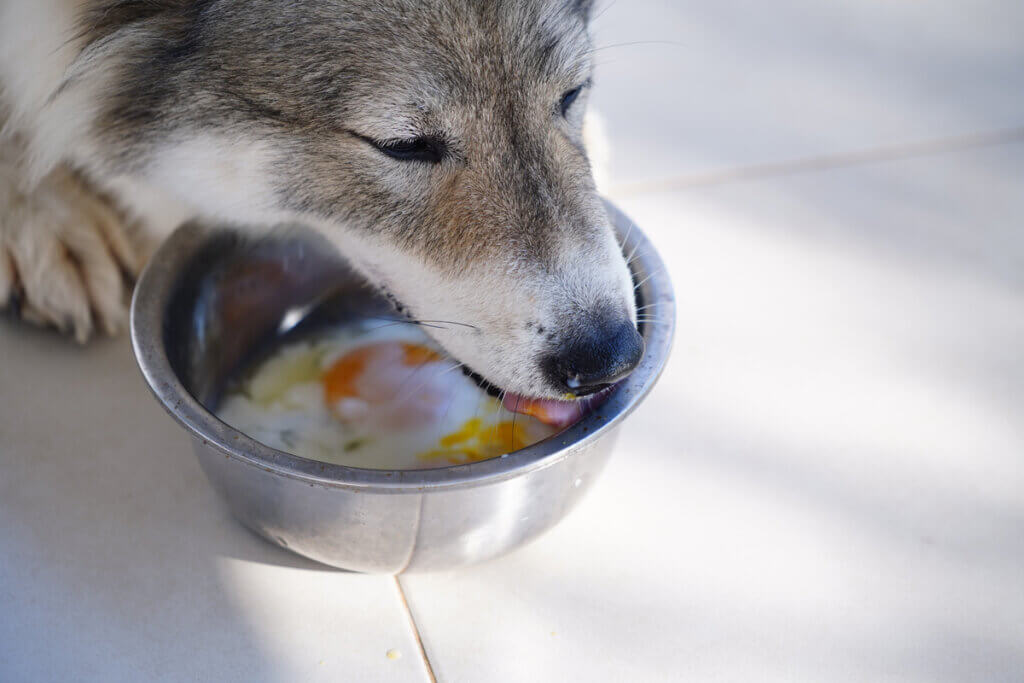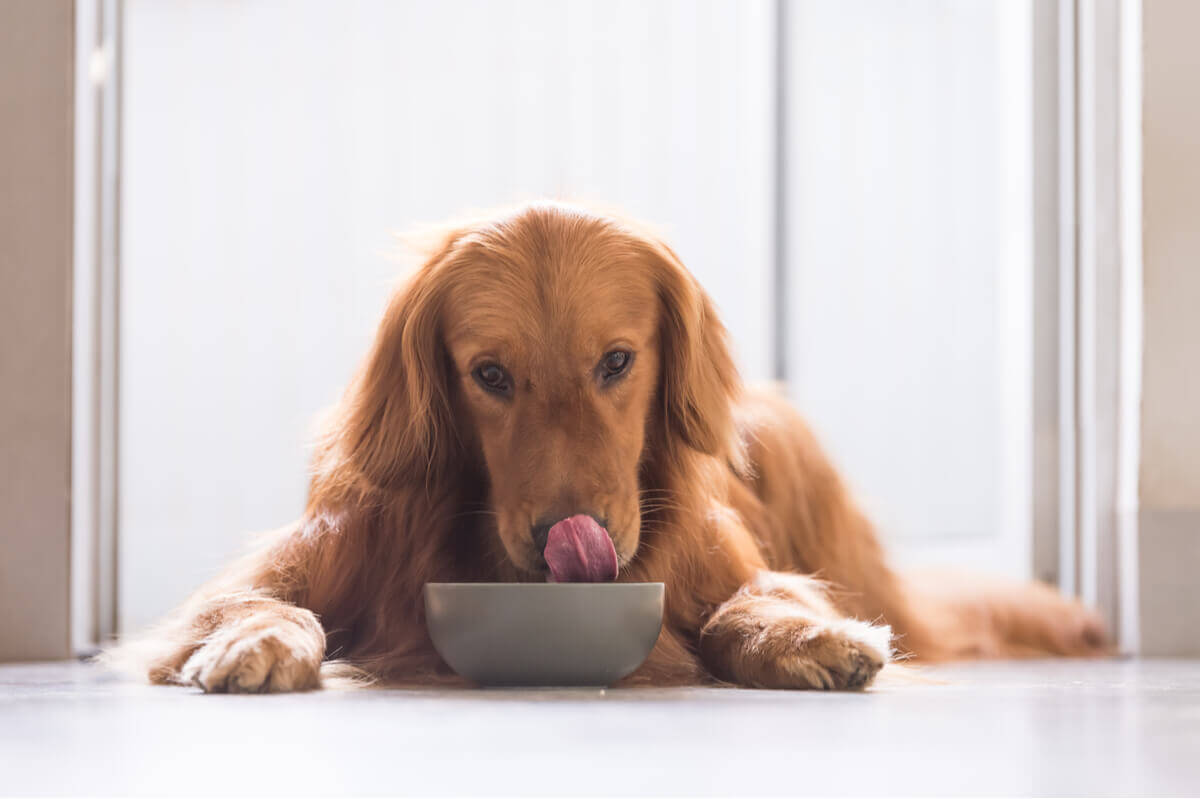Is It Safe for Dogs to Eat Eggs?

As a dog owner, it can sometimes be a little tricky to keep up with the list of things that dogs can and can’t eat, what is good for them, what is poisonous etc. And, at some point, you may have wondered if it’s safe for dogs to eat eggs?
Now, the answer might be really obvious to you, or it might come as a complete surprise! But if you suspect that giving your dog some eggs to eat now and again might be a bad idea, then read on.
About the canine digestive system
Before we talk about whether or not dogs can properly digest eggs, it’s a good idea to know a little bit about their digestive system. So, let’s look at some key points.
Are dogs carnivorous or omnivorous?
This question often crops up because many dog foods contain non-meat products and dogs don’t seem to have too much trouble digesting them just fine.
This is because a dog’s stomach is best-suited for digesting meat proteins but is also capable of digesting plant proteins because of the presence of an enzyme called pepsin.
As a result, dogs are able to digest nutrients from a variety of different types of food. However, dogs are not omnivorous. Instead, they are what is known as facultative carnivores.

The importance of the microbiota
Dogs can digest various nutrients thanks to the different species of bacteria found in their intestines. All these colonies of microorganisms are what make the intestines work correctly.
Furthermore, some strains of bacteria play a positive role in the body, such as Lactobacillus, Streptococcus, and Clostridium.
However, you will more likely have heard of these bacteria because they’re contained in probiotic foods. These are foods or supplements that help to regulate the intestinal flora, whether for people or for dogs.
They’re normally recommended when receiving antibiotic treatment or if suffering from stress. They’re a way of making sure that the good bacteria are able to survive in the gastrointestinal tract without the harmful bacteria also thriving.
Is it safe for dogs to eat eggs?
So, now that we’ve taken a brief look at how a dog’s digestive system works, we can look at a few questions, including whether or not they can safely eat eggs.
Can dogs eat eggs?
Yes, dogs can eat eggs, and you might want to feed your dog eggs on a regular basis. Eggs are highly nutritious and good for dogs because they contain the following:
- Proteins. These are high-quality proteins and their essential amino acids are really important for dogs.
- Essential fatty acids. In general, these are essential nutrients for the body and they include omega-3 acids.
- Vitamins. Eggs contain vitamins A, D, E, and K.
- Minerals. Likewise, eggs also contain minerals like iron, zinc, selenium, and phosphorus. Together with vitamins, these can be really beneficial for your dog’s nervous system.
Beware of salmonella!
So, clearly, eggs are good for your dog. However, it’s important to remember that they must be cooked first! If your dog regularly eats raw eggs, they could suffer from salmonella poisoning.
Furthermore, raw egg whites contain a protein called avidin. This protein makes it difficult to absorb vitamin H, so the egg needs to be cooked first to avoid this. So, always make sure that you cook eggs first to make sure that your dog can absorb all the nutrients they need.
How should I feed eggs to my dog? Are eggs compatible with diets like the BARF diet?
The best way to feed your dog eggs is by boiling them or frying them first. This will avoid the risk of salmonella and other problems caused by microorganisms. Whilst it can be compatible with a BARF diet, you will need to be careful with raw eggs or any derivative products.
These types of diet focus on various raw foods, but as we’ve already seen, some foods simply have to be cooked before your dog can eat them. These include eggs, fish, and meat.
Furthermore, if you’re going to give your dog a special diet, it’s always best to do so with the help of a vet. That way, the diet will be the most appropriate one for their dog, both in terms of their overall health and how active they are.
However, each dog is special and unique. If you’re planning on feeding eggs to your dog regularly, you might want to try feeding them just a little bit to begin with in case they don’t like it or suffer from some adverse reaction.
For example, your dog could actually have an allergy. By just feeding them a little bit first, you’ll be able to make sure that it’s safe for them. This goes for pretty much any food that you don’t normally feed to your pet.

So, as you can see, it is indeed safe for dogs to eat eggs. In fact, it may even be highly recommended. Boiled eggs could be a highly beneficial addition to your dog’s diet.
However, if you have any doubts or are considering changes to your dog’s diet, consult with your vet first. That way, you’ll be able to make sure that your dog gets all the nutrients they need.
All cited sources were thoroughly reviewed by our team to ensure their quality, reliability, currency, and validity. The bibliography of this article was considered reliable and of academic or scientific accuracy.
- El gran libro del Huevo. Instituto del Estudio del Huevo. Recogido a 12 de noviembre de 2020 en: http://institutohuevo.com/wp-content/uploads/2017/07/EL-GRAN-LIBRO-DEL-HUEVO.pdf
- EMPLEO DE PROBIÓTICOS EN LOS ANIMALES. Produccion-animal.com. Recogido a 12 de noviembre de 2020 en: http://www.produccion-animal.com.ar/informacion_tecnica/invernada_promotores_crecimiento/45-Empleo_probioticos.pdf